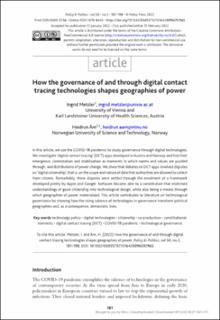How the governance of and through digital contact tracing technologies shapes geographies of power
Peer reviewed, Journal article
Published version
Permanent lenke
https://hdl.handle.net/11250/3041944Utgivelsesdato
2022Metadata
Vis full innførselSamlinger
Originalversjon
Policy & Politics. 2022, 50 (2), 181-198. https://doi.org/10.1332/030557321X16420096592965Sammendrag
In this article, we use the COVID-19 pandemic to study governance through digital technologies. We investigate ‘digital contact tracing’ (DCT) apps developed in Austria and Norway and find their emergence, contestation and stabilisation as moments in which norms and values are puzzled through, and distributions of power change. We show that debates on DCT apps involved disputes on ‘digital citizenship’, that is, on the scope and nature of data that authorities are allowed to collect from citizens. Remarkably, these disputes were settled through the enrolment of a framework developed jointly by Apple and Google. Software became akin to a constitution that enshrined understandings of good citizenship into technological design, while also being a means through which geographies of power materialised. This article contributes to literature on technological governance by showing how the rising salience of technologies in governance transform political geographies and, as a consequence, democratic lives.

